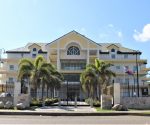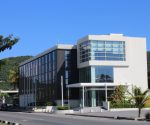A thoughtful expose
By Hilbert Haar
Running a country is not a profitable business. If the Netherlands, or St. Maarten or Curacao for that matter, had been private sector businesses they would have had to close their doors a long time ago.
There is a lot of talk about the debt to gross domestic product ratio (debt:GDP) and how, for small open economies like St. Maarten, it should preferably not exceed 40 percent. But what is the situation around the world? The debt:GDP ratio of the European Union is 80 percent. On the extreme end of the spectrum are Greece (181) and Japan (237.6 percent) and on the other end sits Estonia with a comfortable 8 percent. The national debt of the Netherlands hovers according to debtclocks.eu around €398,564,215,000. The public debt to GDP ratio is 50.5%. By comparison, the islands aren’t doing all that bad.
 Yet there is great concern in the Netherlands about the economic development of Curacao. Hence the Onderlinge Regeling Curacao-Nederland (ORCN); this is a mutual agreement about stimulating the island’s economy. It has caught the attention of Dr. Emsley Tromp, the former president of the Central Bank of Curacao and Sint Maarten. Tromp wrote a thoughtful expose about this agreement and his arguments give some credibility to a statement once made by St. Maarten’s young MP Rolando Brison: “I think the Cft is one of the biggest problems we have as a country.”
Yet there is great concern in the Netherlands about the economic development of Curacao. Hence the Onderlinge Regeling Curacao-Nederland (ORCN); this is a mutual agreement about stimulating the island’s economy. It has caught the attention of Dr. Emsley Tromp, the former president of the Central Bank of Curacao and Sint Maarten. Tromp wrote a thoughtful expose about this agreement and his arguments give some credibility to a statement once made by St. Maarten’s young MP Rolando Brison: “I think the Cft is one of the biggest problems we have as a country.”
The Cft is the financial supervisor that monitors how Curacao and St. Maarten abide by the budget rules laid down in the consensus kingdom law financial supervision (Rft).
Tromp writes in his opinion that sound public finances are a necessary condition for sustained economic growth. The Rft demands, for instance, that the islands present a balanced budget; the idea is to prevent Curacao and St. Maarten from running up huge national debts. In itself that makes sense if you realize that – in spite of the Rft – St. Maarten managed to create a combined deficit of 80 million guilders between 2010 and 2015. Those debts don’t go away – they carry over to the next budget year and sooner or later they will have to be paid off.
But Tromp considers the Rft-regime, and the conditions Curacao agreed upon in the ORCN too rigid. They want to fix short-term economic ills with long-term solutions, the former Central Bank president warns. Tromp’s opinion matters, giving his decades-long career at the Central Bank and his current a-political position.
Tromp warns against the “unfettered implementation” of Rft and ORCN-criteria. They will lead to an increased poverty rate, higher unemployment, the influx of cheap migrants and the forced departure of highly skilled workers. Furthermore – and this ought to get the attention in The Hague - it will induce migration from Curacao to the Netherlands. To top it off, all this will lead to suboptimal healthcare and education systems.
Tromp furthermore is of the opinion that the agreement with the Netherlands will lead to social dislocation, the lack of skilled labor and an unacceptably high cost of living.
So the people who live in Curacao will be confronted with the cost of the agreement. Taxes will have to go up and in turn, Tromp argues, this will make economic growth even more elusive.

The agreement contains a provision for a 180 million guilders Dutch loan to Curacao (once conditions are met). This will obviously increase Curacao’s debt to GDP ratio. And what’s more: to service this debt (to pay the interest and to pay it off over time) requires the government to “create budgetary room” for these expenses. That in turn will require additional measures (read: more taxes). The same goes for the plan to refinance maturing outstanding debts.
While Trump’s observations focus on the situation in Curacao, one may well wonder up to which point his arguments are also true for St. Maarten. The Rft’s balanced-budget rule and the interest burden rule are both geared towards getting a grip on the country’s debt levels. The interest burden on outstanding loans is not allowed to exceed 5 percent of the average state-revenue over the past three years.
In the meantime, St. Maarten is struggling with serious issues that have paralyzed politics for years. The main current issues are the dismal condition of the Pointe Blanche prison and the seemingly endless problems with the landfill on Pond Island.
Given Tromp’s expertise and standing it cannot hurt to ask him for an analysis of St. Maarten’s economic future and for hints at workable solutions. It would give local politicians finally some valid arguments that go beyond their party-politics interests.
###
Below is the complete article written by Dr. Emsley D. Tromp for our subscribers.
LOGIN TO READ MORE... THIS IS A PREMIUM ARTICLE. YOU NEED AT LEAST YEARLY SUBSCRIPTION TO ACCESS THIS ARTICLE.
...
Some articles or portions of articles are restricted exclusively for our registered members and paying subscribers. Please login here to read the rest of this article. If you do not already have a paid subscription, you will need to register here and pay for a subscription first in order to gain access to our website to read articles or contents that are restricted to paid subscribers. You need to buy at least a Day subscription for 75ct to gain access. Or log in first if you are already a registered paying subscriber to this website. Click here to register and support our work with a paid subscription.






















